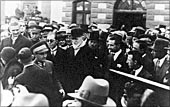|
|
 |
 |
 |
 |
 |
 |
| The refugees issue
The phenomenon of the incursion of a huge refugee population in the period 1922-23 has two facets. On the one hand it put an unbearable strain on the already overstretched state budget, and on the other it became - within a short time - the reason and basis for the development of the Greek economy. In the harsh conditions of the world economic crisis, the task of resettlement of the refugees functioned as a mechanism for overcoming the depression and also as a springboard for the reconstruction of the economy.
State intervention took various forms and was structured at different
levels (institutional, economic, political). The Fourth National Assembly
of 1924, through a number of measures, attempted to resolve some of
the crucial institutional problems (e.g. status of granting loans,
expropriations etc.). At the same time, between 1923 and 1928 the
state issued six loans in favour of the refugees up to £10.5 million
pounds sterling, with advantageous terms for repayment. Finally, with
the personal intervention of Eleftherios Venizelos, and in the framework
of the reconciliation policy with Turkey, Greek assets in Asia Minor
were set off with the equivalent ones of the Ottoman people that were
forced to leave Greece and the Turkish state.
|
 |
 |
|




